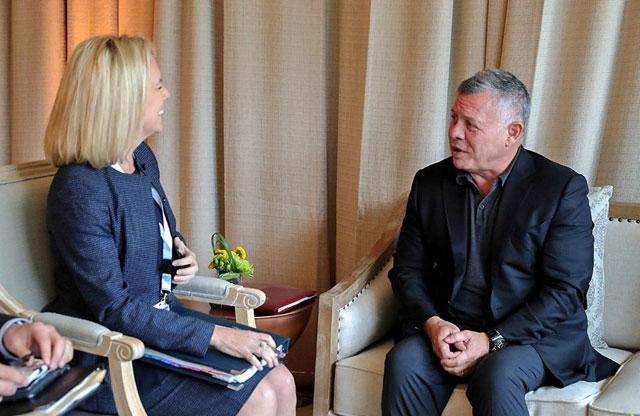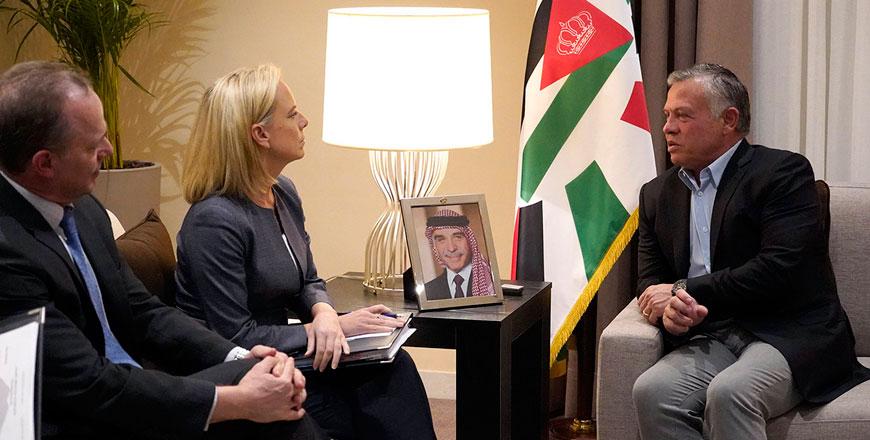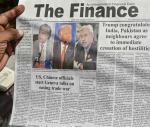You are here
‘Comprehensive plan essential to combat extremist ideologies’
By Rana Husseini - Nov 16,2017 - Last updated at Nov 16,2017
AMMAN — Jordanian and Arab officials on Wednesday said that fighting extremist thoughts and ideologies through a comprehensive plan is essential in minimising the threat worldwide.
“Fighting extremist ideologies is essential to combat terrorism and we can do this by spreading peaceful thoughts that encourage the respect of the rule of law, pluralism and the other,” said Musa Maaytah, minister of political and parliamentary affairs.
Maaytah, who was deputising for Prime Minister Hani Mulki, made his remarks at the opening session of the 11th session of the Amman Security Colloquium held at the University of Jordan.
The high level event is organised by the Arab Institute of Security Studies and sponsored by the Geneva Centre for Security Policy (GCSP), the Government of the Netherlands and the Nuclear Threat Initiative (NTI).
Maaytah said that Jordan’s historical and geographical position, which lies in a hot conflict zone, “is reflecting negatively on Jordan’s politics, security, and economy”.
“We realise the amount of challenges facing our country, and that is why our Jordanian diplomacy has been wise and balanced and only seeks political solutions and dialogue without interfering in the Arab, regional and international affairs,” Maaytah added.
The same applies to the Syrian conflict since “our position has always been to call for a peaceful and political solution in Syria and our interference was limited to the humanitarian aspect of receiving refugees despite the limited resources,” he noted.
The recent developments in the region have resulted in “the apparition of terror groups that used religion and chaos to spread poisonous ideologies in our society”, the minister said.
Also speaking during the opening session was the undersecretary general of the United Nations office of counter-terrorism, Vladimir Voronkov.
“Today, in many regions of the world, preventing and resolving conflicts is increasingly dependent on effectively preventing and countering terrorism,” Voronkov told the gathering.
The UN official added: “Arabs, Muslims and other communities are the first victims of terrorism,” highlighting the fact that “terrorism affects us all and should not be associated with any religion, nationality or ethnic group”.
Voronkov also pointed out to the recent establishment of the UN office of counter-terrorism that is headed by António Guterres.
“This new office of counter-terrorism is intended to provide leadership in the UN’s work to address counter-terrorism; enhance coordination and coherence across relevant UN bodies and international organisations; and strengthen capacity-building activities in support of member states, always upon their request,” Voronkov explained.
Also addressing the gathering during the opening session was Maj. Ali Ruewaili, a retired officer in the army of the Kingdom of Saudi Arabia who said that “terrorism is a world-wide phenomenon”.
“The UN lists 139 organisations on its black list because they are considered terrorists. Only 19 of these organisations are in the Middle east,” said Ruewaili, who is the director of the special training programmes at Prince Nayef Arab University for Security Science.
Ruewaili highlighted the efforts exerted by his country in fighting terrorism globally.
“Saudi Arabia donated over $100 million to the UN and other entities to help in fighting terrorism,” Ruewaili said.
Internally, Ruewaili added, “we worked on three fronts and have succeeded in aborting 220 possible terror operations.”
“We are also focusing on educating people and raising awareness about the threats of terror and have established several advisory centres to reach out to potential individuals who might carry out terror acts and spread extremist thoughts and to fight terrorism funding and money laundering,” Ruewaili explained.
The two-day event is one of the few annual gatherings aimed at discussing emerging regional and global security challenges, and opens the door for discussions and interactions among local and international politicians, decision makers and diplomats.
The colloquium will be hosting a number of high level organisations with representatives from the US, the EU, Iran, Saudi Arabia, among other countries.
Related Articles
AMMAN — Foreign Minister Ayman Safadi on Wednesday met with Vladimir Voronkov, the undersecretary general of the UN counter-terrorism office
AMMAN — His Majesty King Abdullah on Tuesday participated in the latest round of the Aqaba meetings, hosted by the US in partnership with Jo
AMMAN — His Majesty King Abdullah met with a number of heads of the delegations attending the latest round of the Aqaba meetings, which open


















